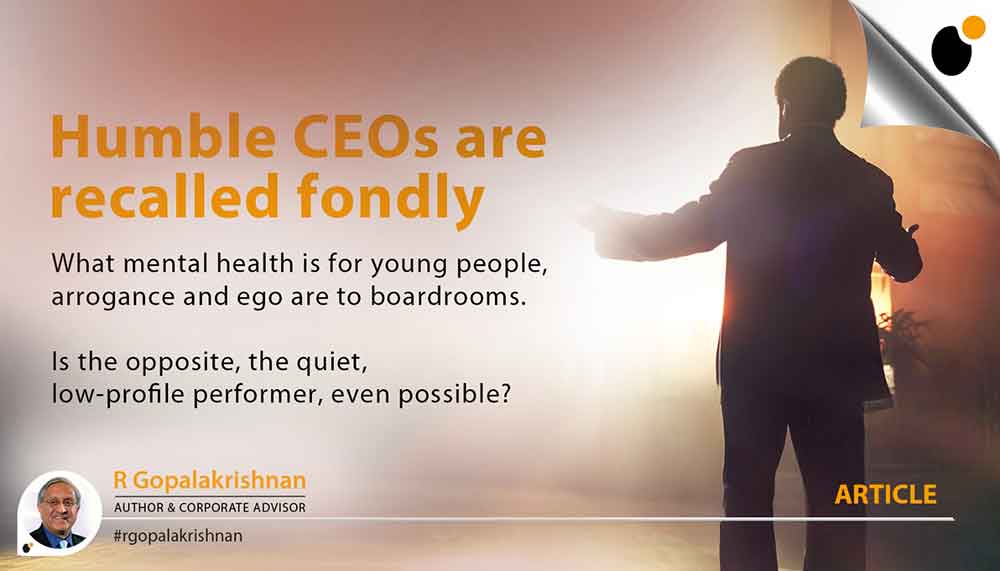BS Business & Purpose (1)
Preserving SHE values in institutions.
By R Gopalakrishnan*
I am happy to write this new column “Business & Purpose.” Last week this paper reviewed “Progressive Capitalism” by US Congressman Ro Khanna. The book made a case for decentralized capitalism. Asia Society India will shortly host a seminar on Balancing Profit and Purpose. Everywhere, the world seems to be searching for a different capitalism—Decentralized Capitalism, Conscious Capitalism, Enlightened Capitalism, Conscious Enterprise and so on. By overlaying my professional experiences on to these great ideas, I was led to the acronym SHE–Sustained, Humane, and Enlightened enterprise.
Long-living institutions—companies, scientific, charity, educational—must overcome two obstacles regarding values: first, developing sound SHE values; second, the preserving those SHE values across generations.
Although set in the context of India’s freedom struggle, Gandhiji practiced the philosophy of truth, ahimsa, and satyagraha. Symbols like loin cloth, charkha, and Dandi march iconized his practices. His narratives and rituals were continual reminders to people, for example, group prayers, fasting, and jail terms. These days, we observe several pyrotechnics to perpetuate ideology and to create reality-distortion fields around leaders: celebrating India’s alternative icons, narratives of history, and practicing rituals while inaugurating secular institutions. Such exercises are slick as is the pitch of a used car salesman, even if implausible to several.
A national economy is accelerated by the nurturing of SHE institutions because such institutions are national assets. SHE companies pay taxes, create jobs, innovate technologies, treat people decently, and inspire the community, all the while being sustainable, humane, and enlightened.
Setting up a company with strong SHE values is difficult. Remaining a SHE company after the founder’s time is even more difficult.
Early leaders may implant deep-rooted and socially relevant values into the DNA of the organization, for example, Johnson & Johnson, Marks & Spencer, Cadbury, or Indian groups like Mahindra, Tata, Godrej, Bajaj, Birla.
Metaphorically, developing and perpetuating SHE values is like a long river, from its origin till it rushes to meet the sea. From a trickle at origin, the river flows freely, develops currents, and becomes bigger due to land gradients and hydrology. Rivers bring bounty for people whom they serve. The trickle at origin is always “simple and elegant”. This is also true of the core of ideas and religions.
As the river follows nature’s contours, it may appear complex and intimidating. The wide river develops its own character, much like ideas develop their own complexity due to icons and narratives. Complexity gets added through narratives, icons, and rituals.
In its final stretch, a vigorous delta rushes to meet the ocean and to lose its own identity. That is the essence of all leadership. The delta represents the multiplicity of rituals to honour the same philosophy with different narratives and icons of the simple idea.
This metaphor of the river provides a four-stage mental model: Philosophy—Icons–Narratives—Rituals, validated by the birth and spread of world’s greatest ideas in religion, science, and philosophy.
Enterprise must have a philosophy, which grapples with three inter-related questions: (i) what constitutes a philosophy for an enterprise, (ii) how that philosophy will be practiced and transmitted, and (iii) how it will be preserved for long. There is no formula for the successful preservation of founding values.
Finding out why many failed to preserve values is easier. Consider two food companies, both of which got a fillip due to two different wars.
First, the Camelot chocolate company, Cadbury. John Cadbury, the son of an abstinent Quaker added cocoa to his trading list of tea and coffee in the 1800s. John Cadbury was as determined as his father to improve the world around him. In keeping with this philosophy, the family opened a chocolate township called Bournville, a bit like Port Sunlight of Unilever and Jamshedpur of Tata. Cadbury benefitted a great deal out of the First World War when its products were regarded as nutritious and convenient for the fighting troops.
By 1965, the leadership passed to thirty-four-year-old family descendant, Adrian Cadbury (famous for Cadbury Committee on Corporate Governance). Cadbury engaged McKinsey Consultants to improve his company; Americanization of British industrial thinking had begun. There followed a management restructuring, then a sale of the confectionary business to American drinks company, Schweppes, which was dominantly profit oriented. Early founder John Cadbury’s communitarian and humane philosophy was lost in the change in ownership.
Second, an iconic British brand, Bovril, which is a nutritious beef extract product. Responding to a call for nutrition for a fighting British army in the Franco-Prussian War, an innovative Scottish chemist called John Lawson Johnston, formulated a beef extract branded as Bovril, later joined by a vegetarian Marmite. To consumers, the brand blended meat, myth, and magic. By 1960, the descendants could no longer competently run the listed company. The founder’s philosophy of “healthy, warm nutrition for workers” gave way to other philosophies as the business changed hands, first under investor James Goldsmith, and under Unilever which bought in 2001. A tangential and light-hearted observation is that a descendant of the creator of beef-extract married a Hindu girl!
Rivers end their journey for many reasons, so also it is with business philosophies. Change of ownership is a frequent cause of losing founding values. Preserving SHE values across generations of leadership is difficult for other reasons as well, for example, changing societal values, and appointing ‘wrong’ successors.
*The writer is an author and a business commentator. His articles and videos can be accessed at his website www.themindworks.me and his email ID is rgopal@themindworks.me



